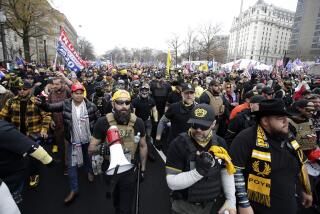CITIES / BILLBOARD BATTLE : Priest Pleads Moral Right to Deface Ads : Chicagoan says heavy use of outdoor liquor, tobacco signs in poor areas is genocide.
- Share via
CHICAGO — Vandalism and battery are rarely headline-grabbing crimes, but Father Michael Pfleger hopes his trial on those charges next month will help ignite a national drive to rid minority neighborhoods of liquor and cigarette billboards.
Pfleger, an outspoken Roman Catholic priest, has been accused of defacing outdoor signs and tossing paint on the owner of a billboard company who tried to stop him. In an echo of a civil rights theme from the days of lunch counter sit-ins and bus boycotts, Pfleger plans to argue that he has a “moral necessity” to fight what he contends is saturation advertising of harmful substances in poor parts of town.
Whatever the outcome, the case highlights a budding conflict between the demands of social crusaders and the rights of advertisers to promote their products.
THE CRITICS: Last year, nearly 20% of the billboard industry’s $1.487 billion in revenue was earned from tobacco and liquor ads, trade group figures show. Although signs hawking cigarettes or beer can be found almost anywhere in the country, critics contend that they are abnormally concentrated in low-income areas or neighborhoods where blacks and Latinos live.
Scenic America, a Washington-based anti-billboard group, said surveys in Baltimore, Detroit, Washington, St. Louis, Atlanta and other cities have found that the vast majority of billboards in minority neighborhoods promote tobacco or alcohol. The numbers in white neighborhoods are far lower.
Pfleger, who is white, said he recently counted every billboard within a 10-block radius of his all-black South Side parish and found 118 pasted with cigarette or liquor ads. By contrast, in a similar-size white neighborhood on the city’s North Side, he found only three cigarette or liquor signs.
“When you target a particular race of people with (ads for) two of the nation’s top killers, that’s genocide,” Pfleger charged.
THE INDUSTRY: Spokesmen for billboard companies cite such criticism as a classic case of attacking the messenger rather than the message. They do not deny that billboard pitches are tailored to appeal to particular ethnic groups but say that so-called “targeting” is a common, cost-effective practice in all forms of advertising.
Billboard firms say that complaints from Pfleger and others have led them to reevaluate the positioning of some of their signs and they have voluntarily moved liquor and cigarette ads farther from schools and churches. But Steve Shinn, a spokesman for Gannett Outdoor Advertising of Chicago, one of five major billboard companies operating here, said critics are trying to legislate morality and limit free speech.
“It’s a very paternalistic attitude to say these people (in minority neighborhoods) don’t have the ability to make their own decisions,” Shinn said. “ . . . If I don’t agree that the Catholic Church should have bingo games because I don’t believe in gambling, should I have the right to whitewash their bingo signs?”
OUTLOOK: Pfleger’s trial is set for Sept. 11. Meanwhile, more billboards on the South Side continue to be hit by vandals, who mar their messages with paint or antismoking and antidrinking graffiti.
And the City Council, under the sponsorship of one of Mayor Richard M. Daley’s floor leaders, is considering what could be the most sweeping anti-tobacco ordinance in the country. It would not only ban outdoor tobacco advertising but might virtually forbid the operation of cigarette vending machines as well as raise the legal smoking age to 19 from 18.
More to Read
Sign up for Essential California
The most important California stories and recommendations in your inbox every morning.
You may occasionally receive promotional content from the Los Angeles Times.













